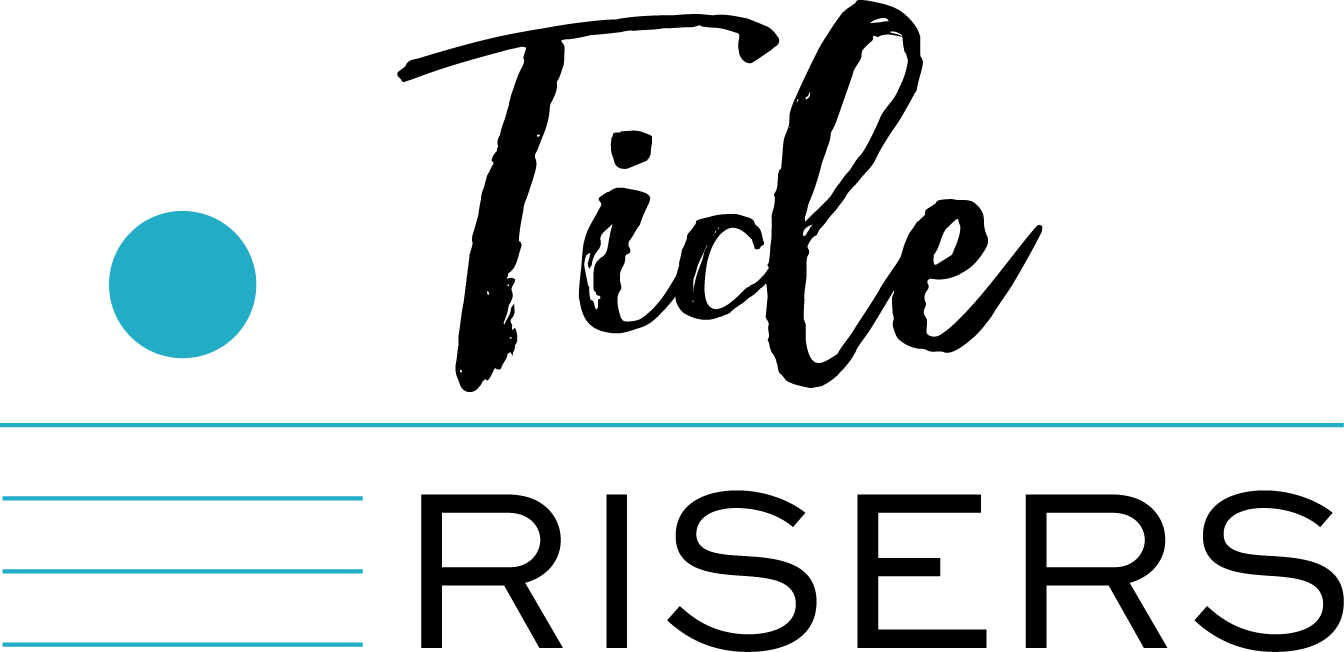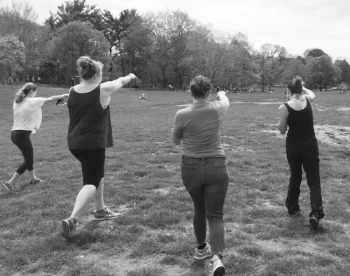Way Opening & Decision-Making, Quaker-Style
At our Tide Risers skill-building workshop this past weekend, Vanessa Chakour, former pro-boxer, herbalist, and leader of rewilding retreats, led us through a beginner’s guide to a martial art form that she herself had developed, called Sacred Warrior Training.
So a group of us are out on Long Meadow Field in Prospect Park learning how to throw jabs, how to ground ourselves so we’re not easily knocked over, and practicing fixing a gaze versus a stare. As I was jamming my arm forward in what I thought was a powerful punch, Vanessa encouraged me to actually loosen up and do less work. She said: “It is when we let go that we are fully in our power.” She explained that when you relax your arm, you enable your full body weight to get behind your punch, packing a lot more power than we would ever get out of our arm strength alone.
Letting go enables us to be fully in our power.
Of the nearly 50 applications we received for this year’s Tide Risers cohort, almost every one of them revealed a struggle to determine what is next in her personal life and/or professional sphere. The perception of an inability to move ourselves forward is a powerlessness many of us have experienced. How do we regain that power to move forward? Is there a letting go that can facilitate such change?
In an effort to help our members make the bold decisions they need to make to move themselves forward, at our last Tide Risers session I shared a powerful but rather obscure concept that I have long used as a resource and guide as I have had to make difficult decisions and face challenging situations.
It’s the Quaker concept of Way Opening. ‘Way will open’ is a phrase used when we know some kind of change or action has to take place, but we can’t quite figure out the pathway to accomplishing the necessary action. We’ve all faced this moment. Maybe you’re there right now. It’s when you want or need to make a change, to move forward, to pivot. But you’re unclear as to how to make that happen.
Many of us have a variety of decision-making processes we use. You may write pro and con lists. You may seek advice from friends, colleagues, and family members. Maybe you even flip a coin from time to time. Most of our decision-making practices require some version of forceful effort, much as my punches were taxing my upper body strength in the park this weekend.
Allowing Way to Open is different. It demands a period of expectant waiting that can feel sometimes like you’re not making any forward progress at all. It means you have to be ok with not having a solution for a period of time. You have to let the effort go, and allow yourself to just be in a place of uncertainty for an unspecified period of time. For fans of Keats, it is his concept of Negative Capability: when someone is 'capable of being in doubts, uncertainties, mysteries, without any irritable reaching after fact and reason...'
Hard, right? Indeed, even for those of us who have been practicing it for decades. My experience with Quakerism and its practices has been such that I have come to recognize the importance of process; it is more important to focus on the process than the outcome. Finding Truth isn’t so much about the truth itself; it’s about the process to get there.
You will often see the concept of searching for Way to Open come into practice when Quakers are laboring to make a decision. Quakers use a unity-based decision-making process that requires all members of a group to sit and deliberate together until they can come to unity on a decision to take action. As you can imagine, this can be a very long and laborious process. Finding a solution that everyone is comfortable agreeing to — or at least not getting in the way of an agreement — can be tremendously challenging.
Throughout this process, we look for Way Opening. It often comes via a pathway that you might not have noticed had you been searching for it. It sometimes feels like something has just been magically dropped in your lap when you were least expecting it. And it is often a solution to the problem that you never would have expected.
Using the model of unity-based decision-making is hard as an individual. You don’t necessarily have the opportunity to deliberate with people using the same practice as you, and you don’t have the benefit of multiple points of view informing the search for truth. We can, however, derive learnings from the practice of searching for Way Opening that can be applied to decision-making on an individual basis, and there are tools and resources that you can put to use right away.
1. Adopt a curiosity about the question or problem. This may mean you might have to take a step back and visualize this as someone else’s question or problem. Ask yourself: what advice would I give a friend grappling with the same question?
2. Reach out to your “committee.” I’m sure you have one. It’s the very few people you trust enough to go to with Big Life Questions. Your committee should be made up of people who have demonstrated an ability to allow you to explore ideas without judgement. It should be people who have known you for years and have seen you through various life stages. If this is two people, that’s enough. Just make sure they’re really there for you.
3. Get a coach. As amazing as your committee is or will be, you may still benefit from a neutral person with the training and discipline to be able to look at your problem or question objectively — something friends and family simply cannot do. Coaches can lead you through a process of asking curious questions and exploring routes we as individuals may be unwilling or unable to explore.
Reach out to Tide Risers if you would like to further explore or discuss the concept of Way Opening. And if anyone is as excited as I am that I was able to combine martial arts and Quakerism into one blog post, give me a shout-out on Instagram or LinkedIn.


